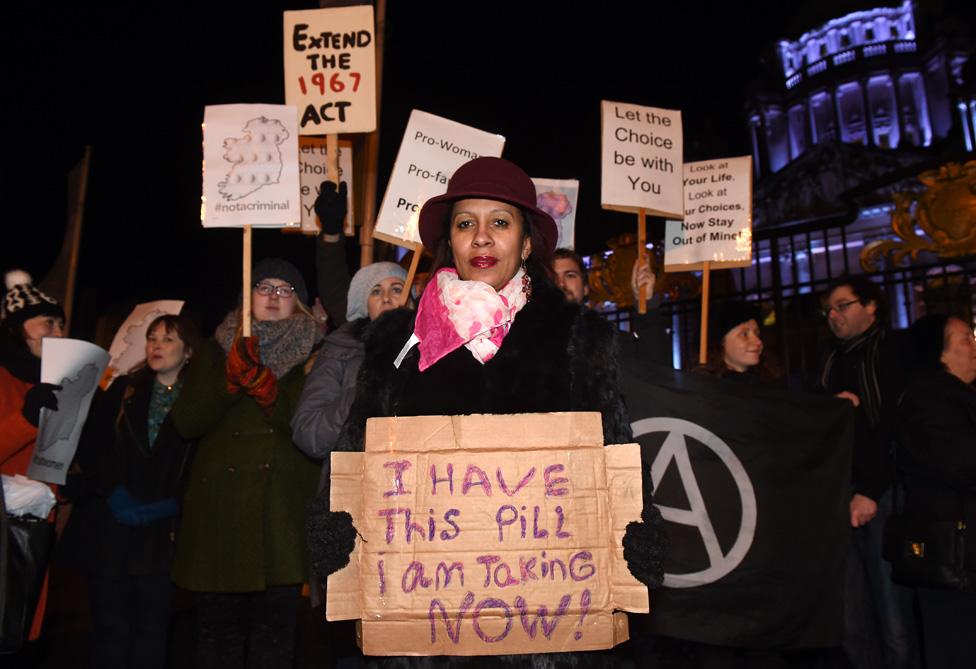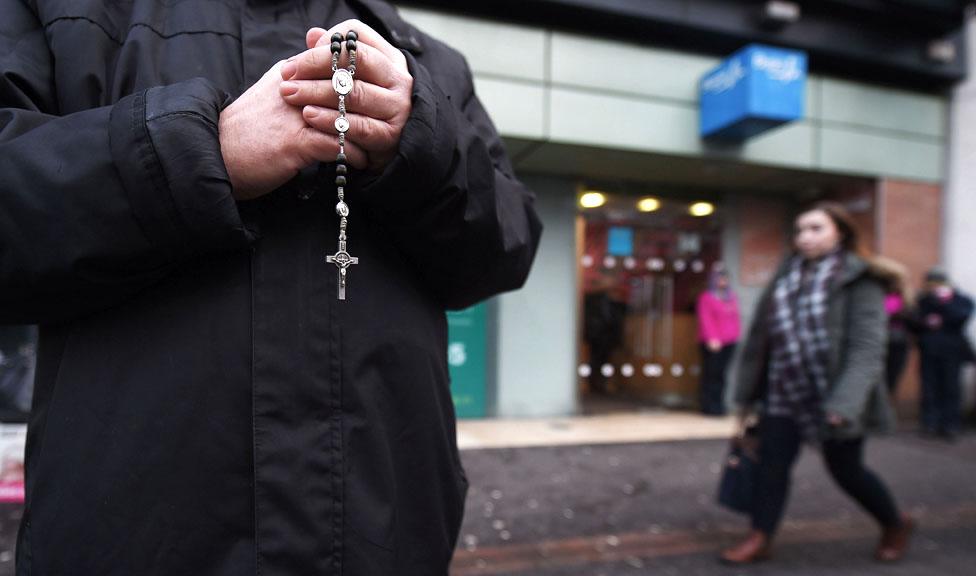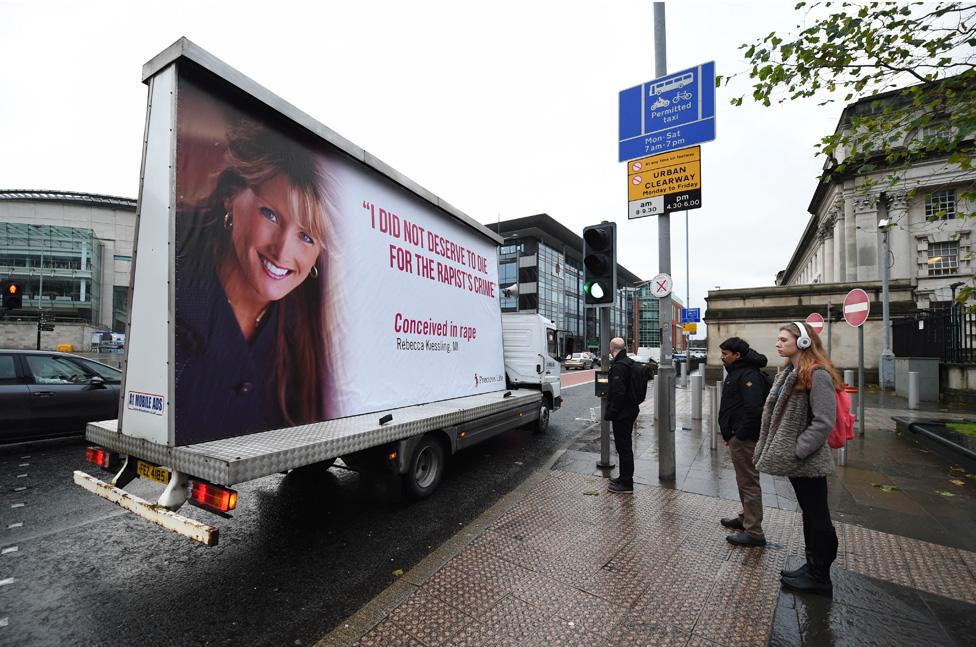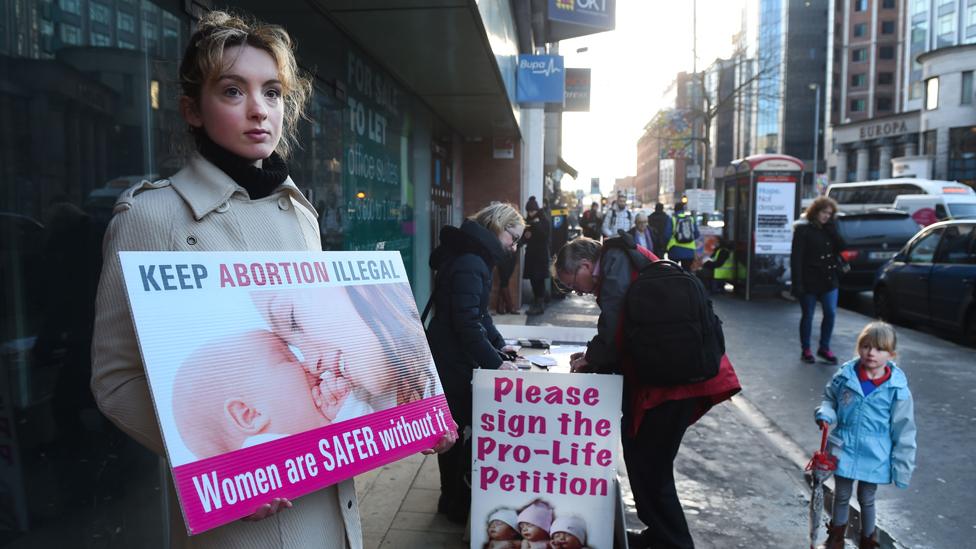Why are Northern Ireland's abortion laws different to the rest of the UK?
- Published

A Belfast woman who bought drugs online to terminate her pregnancy - as she had no access to a legal abortion - has been given a suspended sentence. Why are abortions not allowed in Northern Ireland when they are in the rest of the UK?
The 19-year-old woman didn't have the money to travel to England for a termination, so she bought drugs on the internet to induce a miscarriage. Her housemates then reported her to the police.
It resulted in the woman, now 21, being given a suspended sentence at Belfast Crown Court. Why is the law around abortions in Northern Ireland so different from the rest of the UK?
No Abortion Act
The 1967 Abortion Act, which established legal abortion, has never applied in Northern Ireland. The woman's defence barrister told the judge that had his client lived in any other region of the UK, she would "not have found herself before the courts".
Taking drugs to bring on a miscarriage without doctors' consent is still technically an offence anywhere in the UK under the 1861 Offences Against the Person Act. But in England, Scotland and Wales an abortion can be legally carried out up to the 24-week limit and can be legal beyond that limit in cases where the mother's health is threatened or if there is a substantial risk the baby will have serious disabilities.
Abortion is possible but only in very specific circumstances
The law is far stricter than in the rest of the UK.
In 1945, the Infant Life (Preservation) Act, which permits terminations to preserve the life of the mother, was extended to Northern Ireland. Guidelines issued in March by the Northern Ireland Executive state that access to abortion is only permitted if a woman's life is at risk or there is a permanent or serious risk to her mental or physical health.
Fatal foetal abnormalities, rape and incest are not circumstances in which abortions can be performed legally. The High Court recently ruled, external that this was incompatible with the human rights of women, but the law can only be changed by legislators.

An anti-abortion activist prays outside the Marie Stopes Clinic in Belfast
Whether to change the law is a hugely emotive subject that divides opinion sharply. Amnesty International said the 21-year-old's sentence was "utterly appalling" because a "woman who needs an abortion is not a criminal". By contrast, Bernadette Smyth, director of anti-abortion group Precious Life, said she was shocked that the penalty for a "serious crime" was so "manifestly lenient".
Abortion rates
There were 16 terminations of pregnancy, external in hospitals in Northern Ireland, which has a population of 1.8 million, during 2014/15, down from 23 over the previous 12 months. By contrast there were 184,571 abortions in England and Wales, which has a total population of 56 million, during 2014 and 185,311 in 2013, according to the Department of Health, external.
The journey across the Irish Sea
Of course, these figures don't reflect the total number of Northern Irish women who have abortions. In 2014 the Family Planning Association (FPA) says, external there were 837 abortions performed in England to Northern Ireland residents. A smaller number are thought to travel to Scotland and Wales. Because women from Northern Ireland are not entitled to free abortions on the NHS in England, they must fund the cost of the procedure from their own pocket on top of paying for travel and accommodation, a situation pro-choice campaigners say disproportionately affects the poorest.
Official statistics don't tell the whole story. Many women do not give their home addresses to English clinics. Although they are illegal to buy across the UK, abortion pills are readily available online - which may partly account for the fact that the number of abortions performed to women from Northern Ireland in England has fallen from 1,528 in 2000. Goretti Horgan of the Alliance for Choice told the Guardian, external she has helped up to 20 women obtain this kind of medication.
Relations with Westminster
When the 1967 act was introduced as a Private Members Bill by David Steel, the Parliament of Northern Ireland at Stormont was still making its own laws. There was no appetite among the parliament's members - then dominated by the Ulster Unionist Party - to follow the example set by the rest of the UK, says Fiona Bloomer of Ulster University, an expert in Northern Ireland abortion policy, who is pro-choice. "Essentially they just ignored it. There was no mention of it," she says.
The collapse of Stormont in 1972 introduced direct rule from Westminster, but successive UK governments were reluctant to make Northern Ireland's abortion law the same as that in England, Scotland and Wales. In 1990, Health Minister Virginia Bottomley told the Commons that to her knowledge "no Northern Ireland Member of Parliament has ever called for changes in the Northern Ireland abortion laws".
A 2008 parliamentary move to extend the 1967 act to Northern Ireland was blocked by then-Leader of the Commons Harriet Harman. At the time the government said, external it feared the existing UK abortion laws could have been threatened in the House of Lords as a result had the vote passed. But there was speculation that the Labour government had struck a deal with the Democratic Unionist Party to leave the abortion laws intact in return for their support for its plans to detain terrorism suspects without charge for 42 days.

Religious belief
Northern Ireland's status as the most religious part of the UK might be a relevant factor.
In the 2011 Census, some 82.3% of its residents described themselves as Christian compared with 59.4% in England, 53.8% in Scotland and 57.6% in Wales. Despite the peace process, the fact that Northern Ireland remains a "divided society" along sectarian lines has deepened the influence of the churches, says Bloomer, all the main denominations of which oppose abortion. "Although church attendance is dropping, it's still the highest in the UK," Bloomer adds.
There have been other differences in social policy between Northern Ireland and the rest of the UK. Consensual gay sex was not decriminalised in Northern Ireland until 1982, 15 years later than in England and Wales and two years later than in Scotland. And Northern Ireland remains the only part of the UK where same-sex marriage is not legal, although civil partnership did come in at the same time as the rest of the UK in 2005.
Situation in the Republic of Ireland
In 2013 abortion in the Irish Republic was permitted for the first time under certain conditions - when doctors deem that a woman is at risk of taking her life or that her life is at risk due to medical complications. It does not allow for terminations in cases of rape or incest, or when there is a foetal abnormality.
The law was introduced in the wake of the case of an Indian woman, Savita Halappanavar, who died in a Galway hospital after she was refused an abortion.
The eighth amendment to the Republic's constitution, introduced in 1983, "acknowledges the right to life of the unborn". In what was known as the X Case of 1992, a 13-year-old girl who had been the victim of rape was initially prevented from travelling to England to terminate her pregnancy. This was overturned by the Irish Supreme Court and a referendum approved a further update to the constitution stating that the eighth amendment did not restrict the freedom to travel to another state.
Devolution
Abortion policy was devolved to the Northern Ireland Assembly in 2010 as part of wider policing and justice powers under the Hillsborough Castle Agreement. But the Greens are the only Stormont party to support the full adoption of the same law as in England, Scotland and Wales.
A proposal to legalise abortion in cases of fatal foetal abnormality was defeated in the Northern Ireland Assembly in February by 59 votes to 40. An amendment relating to pregnancies which are the result of rape or incest was defeated by an even wider margin. Precious Life had vowed to "expose" any MLA who voted in favour of the new legislation. On taking office in January, First Minister Arlene Foster said, external she did not support the extension of the 1967 Act to Northern Ireland.
Marion Woods of the anti-abortion group Life Northern Ireland says the lack of support for the 1967 Act in the Assembly is a reflection of the will of the people. "We elect representatives to our Stormont government for a reason - people vote for these parties and these parties have voted to keep the law as it stands," she says.
Public opinion
When the Department for Justice in Northern Ireland conducted a consultation on abortion law in 2014, there were 712 individually written responses and 579 of those opposed change with 133 supporting change. A poll by Millward Brown for Amnesty International in 2014 suggested, external that 69% thought abortion should be legally available in the case of rape, 68% believed it should be in the case of incest and 60% thought it should be where there was a fatal abnormality in the foetus.

A Marie Stopes clinic offering private abortions - on the very limited basis allowed within the Northern Irish legal framework - opened in Belfast in 2012. And the issue was put back on the agenda in 2013 when a Northern Ireland woman named Sarah Ewart spoke out about having to travel to Great Britain for an abortion after she was told she was carrying a baby that had no chance of survival.
The latest case has reignited this long-standing debate. On Tuesday, Precious Life called for the case to be brought to the appeals court. Smyth said a law that "protects from the womb to the tomb" should be upheld. By contrast, Horgan said it was time for politicians to "stop looking over the shoulder" and guarantee women in Northern Ireland the same rights they enjoy in the rest of the UK.
Subscribe to the BBC News Magazine's email newsletter to get articles sent to your inbox.